Buying a car online isn’t just a convenience anymore—it’s becoming the norm. In fact, by 2024, the online car buying market had ballooned to a staggering $258.16 billion, with projections showing it nearly doubling to $518 billion by 2034.
Americans now turn to online car buying platforms for greater transparency, unmatched selection, and fewer headaches than traditional dealerships offer.
But with choices ranging from no-haggle direct sellers like Carvana and CarMax to extensive marketplaces like Autotrader and Cars.com, navigating the world of online car buying platforms can quickly feel overwhelming. Each platform offers distinct advantages and trade-offs, whether you’re diving into online new car buying or searching for a reliable source for online used car buying.
This article simplifies your decision-making process by comparing the features, pros and cons of buying a car online, and delivery experiences of America’s leading online car dealers. Plus, once you’ve found your perfect car, we’ll explain how platforms’ built-in shipping might fall short—and why using an independent shipping solution like Compare The Carrier is often smarter, faster, and more affordable.
Why Buy a Car Online?

Buying a car used to mean spending hours—or even days—at the dealership, haggling prices, and enduring sales pressure. The rise of online car buying platforms like Carvana, CarMax, and the emerging Amazon Autos isn’t just about convenience—it’s about fundamentally reshaping the way Americans purchase vehicles. A recent study revealed that Americans purchasing vehicles online in 2024 saved an average of 42 minutes at the dealership compared to traditional buyers, highlighting just one of many reasons behind the soaring popularity of online car buying platforms.
Today’s digital car buyers aren’t just after convenience. They’re accessing unprecedented nationwide inventories that local dealerships can’t match, effortlessly comparing prices and conditions from their smartphones. With 25% of online car shoppers prioritizing finding the exact vehicle they want—and over half comparing multiple platforms before making a purchase—the advantages of online shopping are undeniable.
Price transparency, streamlined financing processes, and hassle-free trade-ins also top the list of why consumers flock to the best online car sites. In fact, satisfaction rates among online car buyers reached a record high of 78% in recent surveys, underscoring that while buying online has its challenges, the benefits significantly outweigh the cons.
As you dive into comparing the top platforms, consider your priorities—whether convenience, cost, selection, or speed—to find the best match for your car buying journey.
Comparing Top Online Car Buying Platforms
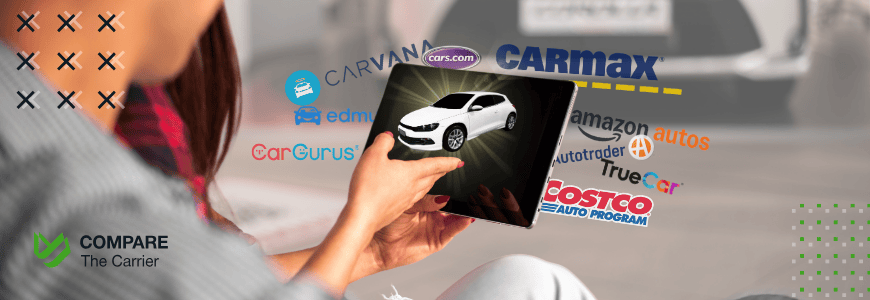
With the rise of digital convenience reshaping how Americans shop for vehicles, there are now multiple robust online car buying platforms catering to different buyer needs. From household names like Carvana and CarMax to innovative newcomers such as Amazon Autos, consumers have more options than ever. Let’s take an in-depth look at each platform’s offerings, delivery methods, strengths, and weaknesses, helping you easily compare car buying websites and choose the best place to buy cars online in 2026.
Please note that the ‘Shipping Fees’ column refers to either the platform’s integrated vehicle delivery fee (if offered) or indicates that the buyer is typically responsible for arranging independent transport, as is common with marketplace listings or dealership pickups.
To simplify your comparison, here’s an easy-to-follow breakdown covering major factors like inventory, buying process, vehicle delivery services, policies, and unique features:
Platform | Vehicle Types | Buying Process | Delivery Options | Return Policy | Shipping Fees | Unique Features |
Carvana | Used Cars, SUVs, Trucks, EVs | Fully digital; select, finance, upload docs online | Home delivery (fee), or pickup from Carvana Vending Machines | 7-day / 400-mile return policy | Delivery fees vary by distance, typically ranging from $190 to $1490 | Iconic car vending machines, no-haggle pricing, comprehensive 150-point car inspection reports, 100-day/4,189-mile limited warranty included |
CarMax | Primarily Used Cars, Trucks, SUVs | Hybrid: online search, finance, pickup/delivery scheduling | Free delivery within 60 miles, store pickup, store-to-store transfers | 10-day return policy | Transfer fees for distant inventory based on mileage (e.g., ~$500 for 500 miles). Free local delivery (within 60 miles in select areas) | Large inventory, physical locations, high trade-in values, no-haggle pricing, 125-point inspection, 90-day/4,000-mile limited warranty included |
New Hyundai vehicles | Online inventory browsing, financing online via Hyundai, dealership pickup | No home delivery offered (dealership pickup only) | Dealership-specific policy | No direct shipping fees (buyer arranges independent shipping if needed) | Familiar Amazon checkout, integration with Hyundai finance, limited U.S. locations, potentially allows leasing new Hyundai models | |
Cars.com | New and Used Vehicles | Marketplace; connects to dealerships | Shipping arranged between buyer and dealer (tool via RunBuggy provided) | Dealer-specific policy | Varies by dealer or independent shipper (Can range from ~$500 – $2500+ depending on distance/type) | Extensive nationwide inventory, robust dealership reviews |
Edmunds | New and Used Vehicles | Research tool and marketplace; connects to dealer listings | Dealer-managed delivery | Dealer-specific policy | Dealer-specific fees | Expert car reviews, TMV® pricing, detailed buying guides |
Autotrader | New, Used, Certified Pre-Owned, Private Listings | Marketplace; connect directly with sellers | Dealer or private seller manages delivery; optional PSX secure delivery service | Seller-specific policy | Dealer-specific and PSX fees | Kelley Blue Book integration, private seller exchange (PSX), instant cash offers, over 3 million car listings |
CarGurus | New, Used, Certified Pre-Owned | Marketplace; integrates finance options, online vehicle reservations | Home delivery offered by select dealers (varied fees) | Dealer-specific policy | Dealer-managed fees (Fees included in listing price for eligible cars) | Price rating tools, finance integration, vehicle reservation feature, over 5 million listings |
TrueCar | New and Used Vehicles | Lead generation; provides guaranteed pricing from dealer network | Dealer or TrueCar+ facilitated delivery (limited markets) | Dealer-specific policy | Varies by dealer or TrueCar+ (Home delivery fees may vary) | TruePrice certificates (upfront pricing), TrueCar+ digital buying (limited areas), certified dealer network |
Facebook Marketplace | Mostly Used Vehicles | Peer-to-peer marketplace; direct buyer-seller transactions | Buyer arranges all transport independently | Typically sold “as-is” | No platform shipping options; buyers must arrange independently | Massive local inventory, free listing, significant buyer risk |
Shift | Used Vehicles | Online browsing, financing, scheduling delivery/pickup | Direct home delivery (fee applies), regional service limitations | 7-day return policy | Distance-based shipping fee applies; Requires a $250 non-refundable deposit | Integrated financing, thorough vehicle inspections, test drives at home ($1250 Service Fee mentioned in older source) |
New and Used Vehicles via Costco’s partner dealers | Facilitates purchases through dealerships offering Costco discounts | Dealer delivery or independent shipping via buyer’s arrangement | Dealer-specific policy | Dealer-specific fees or buyer-arranged transport | Costco membership discounts, negotiated member pricing, high customer satisfaction |
Spotlight on Carvana vs CarMax vs Amazon Autos
When specifically comparing Carvana vs CarMax vs Amazon Autos, these three platforms distinctly represent different models within the digital car buying landscape:
Considering Cheapest Online Car Buying Sites?
For buyers hunting specifically for the cheapest online car buying sites, marketplace platforms like Cars.com, CarGurus, and Autotrader offer tools for extensive price comparisons but involve direct negotiation with dealerships or private sellers. Conversely, direct sellers like Carvana and CarMax offer clearer, upfront prices, often eliminating haggling but possibly limiting bargain opportunities.
It’s important to remember that while these platforms list cars, the final buying experience – including negotiation, paperwork, and delivery arrangements – is typically handled directly by the individual dealership or private seller, leading to a less standardized process compared to direct online retailers.
What About Vehicle Delivery?

It’s crucial to understand each platform’s approach to vehicle delivery services clearly. Integrated delivery from platforms like Carvana and CarMax offers convenience but can be costly and geographically limited. Conversely, marketplaces such as Edmunds, Autotrader, and Cars.com generally require buyers to arrange independent vehicle shipping—this is where specialized providers like Compare The Carrier become invaluable for comparing shipping options. Similarly, Amazon Autos’ dealership-only pickup model necessitates independent arrangements for distant buyers.
Ultimately, choosing the right platform depends significantly on individual needs: your desired vehicle type, budget, preferred convenience level, and willingness to handle independent shipping logistics. The best results often come from combining trusted car buying apps with independent shipping solutions, delivering optimal control, savings, and peace of mind.
Key Factors When Comparing Online Car Buying Platforms
Choosing the right online car buying platform isn’t just about finding a car you like; it’s about finding the platform that offers the process, transparency, and services that best match your needs and comfort level.
As you navigate the options available to American car buyers in 2026, keep these key factors in mind:
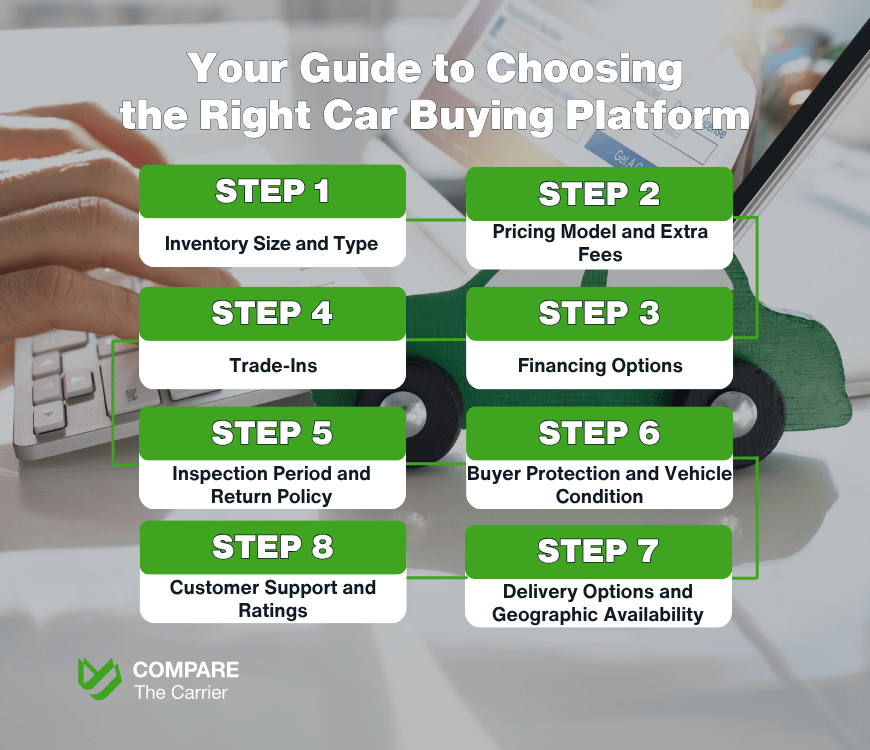
1. Inventory Size and Type
Consider the sheer volume and variety of vehicles available on the platform. Are you looking for a brand new sedan, a specific used truck, or a certified pre-owned SUV?
2. Pricing Model and Extra Fees
Understanding how platforms price vehicles and what additional fees you might encounter is crucial for comparing the true cost.
3. Financing Options
How easy is it to secure financing through the platform, or can you easily use your own lender?
4. Trade-Ins
If you plan to trade in your current vehicle, the process varies significantly online.
5. Inspection Period and Return Policy
Since you’re buying a car you may not have test-driven or inspected in person, the post-purchase inspection and return window is vital.
6. Buyer Protection and Vehicle Condition
Beyond the return policy, what assurances does the platform offer about the vehicle’s quality and history?
7. Delivery Options and Geographic Availability
How will you get the car, and does the platform serve your location?
8. Customer Support and Ratings
What kind of support is available if you encounter issues, and what do other buyers say about their experience?
By carefully evaluating these factors, you can navigate the diverse landscape of online car buying platforms and make an informed decision that goes beyond just the vehicle price.
When and Why to Use Independent Shipping
While many online car buying platforms offer convenient delivery options, it’s crucial for American buyers to understand that these integrated services don’t always cover every scenario. There are specific situations where arranging independent auto transport becomes necessary, even after you’ve completed your car purchase online.
Platform delivery services often work well if you live within a certain radius of the seller’s location (a dealership, a Carvana hub, etc.). However, if your situation falls outside their standard delivery parameters, you’ll need an alternative.
Here are common scenarios where you’ll need to consider independent car shipping:
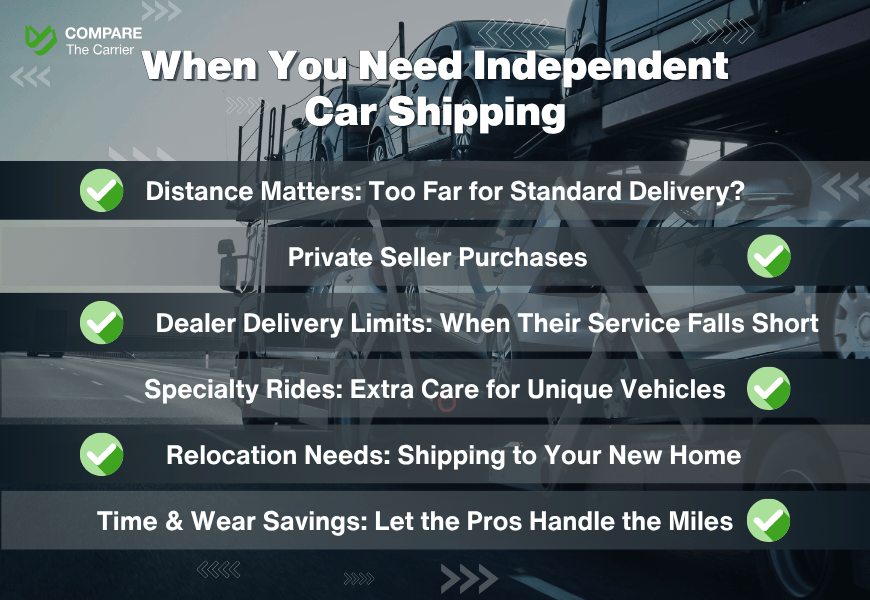
In these situations, relying solely on the online platform’s integrated delivery isn’t an option. You’ll need to find a licensed and insured auto transport company to move your vehicle reliably and safely. This is where comparing independent shipping solutions becomes essential to ensure your new online purchase makes it home without a hitch.
Compare The Carrier: The Best Way to Ship a Car Bought Online
You’ve done your research, compared the platforms, and found the perfect car online. But as we’ve seen, getting that vehicle from the seller’s location to your driveway often requires independent auto transport, especially if you’re buying from out of state or a private seller. This is where Compare The Carrier becomes your essential tool.
Compare The Carrier is a platform designed to assist users in comparing shipping, freight, and moving quotes from leading transport companies. We understand that finding a trustworthy and affordable car shipper after an online purchase can feel like another daunting step. Our goal is to simplify this process, saving you valuable time and money.
Here’s how Compare The Carrier helps make shipping your online car purchase seamless:
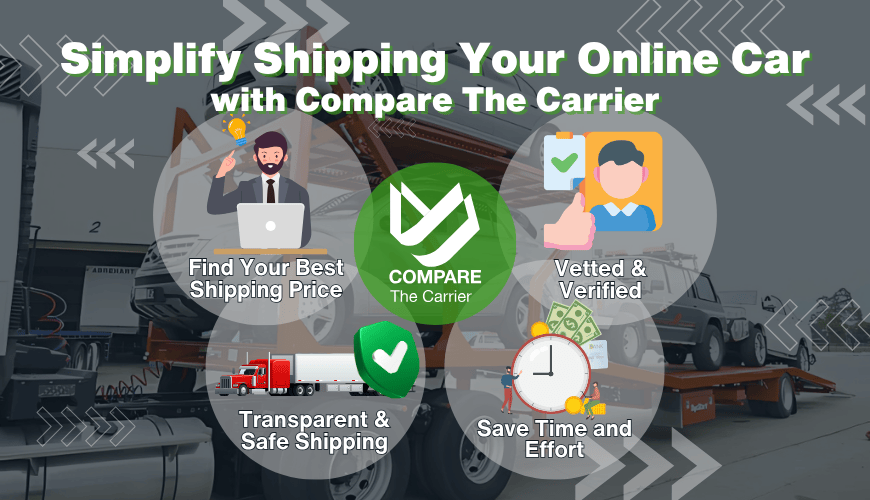
Whether you bought your car from a major online retailer, a marketplace, a dealership website, or a private seller, Compare The Carrier is the go-to solution for arranging reliable and budget-friendly car shipping.
Ready to get your online car purchase home?
Tips for a Smooth Online Car Buying
Buying a car online offers incredible convenience and access to a wider market, but a little preparation goes a long way in ensuring a smooth process from click to delivery. Here are some top tips for American car buyers navigating the digital marketplace:
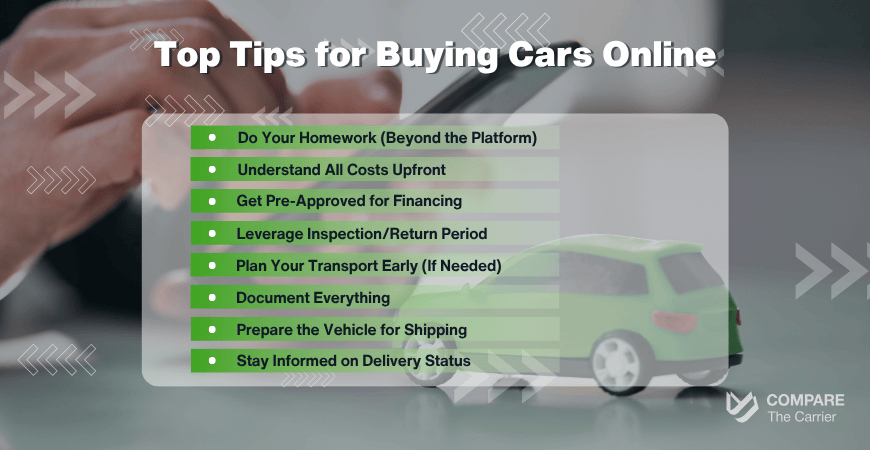
Buying a car isn’t just about the sticker price. By knowing the total cost and arranging reliable shipping, you can relax knowing your car will arrive safely. With a little planning, your dream car can be delivered to your doorstep without any stress!
By following these tips, you can navigate the exciting world of online car buying with confidence and get your dream vehicle delivered right to your doorstep.
Conclusion: Navigating Online Car Buying and Shipping in 2026

Buying a car online has become one of the easiest and most popular ways for Americans to find their next vehicle in 2026. Online platforms offer a huge selection and more transparency than traditional dealerships, letting you choose based on inventory, pricing, or a fully digital experience.
That said, even when buying online, the final step getting your car delivered can be tricky, especially if it’s coming from far away. Platform delivery services can be expensive or limited in certain areas, which is why arranging independent auto transport is often the best solution.
This is where Compare The Carrier comes in. By connecting you with licensed, vetted carriers, we make it simple to get reliable quotes for car shipping. Our service helps ensure your online purchase arrives safely, on time, and at a fair price, no matter where it’s coming from.
Ready to compare shipping options for your online car purchase?
Need a quick estimate? Use our Auto Transport Calculator!
FAQ
Is buying a car from online car buying platforms like Carvana or CarMax safe?
Yes, reputable online car buying platforms prioritize safety and transparency. They typically provide detailed vehicle history reports, conduct multi-point inspections, and offer return policies (like 7-10 day money-back guarantees) that allow you to have the car independently inspected after delivery. Using licensed and insured online car dealers also adds a layer of security compared to unvetted private sales.
How does financing work when I buy car online USA?
Most major online car buying platforms offer integrated online financing. You can usually apply directly on their website and compare loan offers, often getting pre-qualified without affecting your credit score initially. You typically also have the option to secure financing from your own bank or credit union and use that for your online purchase.
What are the main pros and cons of buying a car online compared to a dealership?
The pros of buying a car online include convenience, access to a nationwide inventory, often transparent and no-haggle pricing, and the ability to avoid sales pressure. The cons of buying a car online can include the inability to test drive before purchase (though return policies mitigate this), limited negotiation on price with direct retailers, and potential complexities with delivery or arranging auto transport if buying from a distance.
If I buy car online USA, can I trade in my old vehicle?
Yes, most major online car buying platforms and dealerships you buy from online facilitate trade-ins. They typically offer an online appraisal process to give you an estimated value, which is then confirmed upon physical inspection of your trade-in vehicle at pickup or delivery.
What’s the difference between platform delivery fees and independent car shipping costs?
Platform delivery fees (like those from Carvana or CarMax) are set by the platform for delivering a vehicle from their inventory or hub within a specific service area. Independent car shipping costs are quotes obtained from third-party auto transport companies to move a vehicle from any location (like a distant dealer or private seller) to your desired destination, especially for distances outside standard platform delivery zones. These costs are typically calculated based on distance, vehicle size, and transport type (open or enclosed).

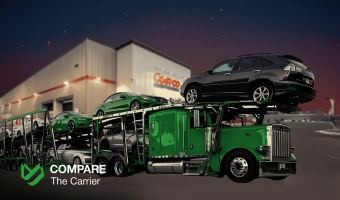






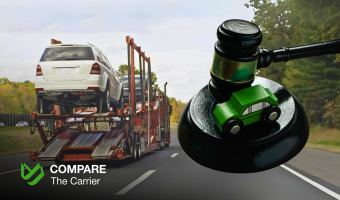
![Most Popular Methods Of Cross Country Car Shipping [2026 Update] 10 10 cross country auto transport](https://comparethecarrier.com/wp-content/uploads/2022/03/Most-Popular-Methods-Of-Cross-Country-Car-Shipping-340x200.jpg)







